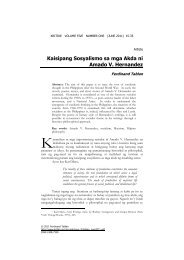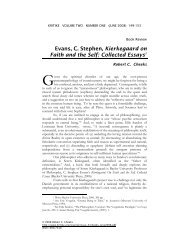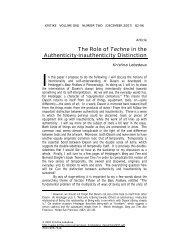Against Alienation: Karol Wojtyla's Theory of Participation
Against Alienation: Karol Wojtyla's Theory of Participation
Against Alienation: Karol Wojtyla's Theory of Participation
Create successful ePaper yourself
Turn your PDF publications into a flip-book with our unique Google optimized e-Paper software.
76 AGAINST ALIENATION<br />
respect the possibility <strong>of</strong> fulfilling themselves in community, either in the social<br />
community <strong>of</strong> a we or in the interpersonal community. 18 <strong>Alienation</strong> treats the<br />
person as an outsider – someone who is not a member <strong>of</strong> the community.<br />
<strong>Alienation</strong> denies the person <strong>of</strong> his right and ability to associate himself with<br />
others to form an interpersonal community. The real threat <strong>of</strong> alienation is not<br />
so much that it “dehumanizes” the human being as an individual member <strong>of</strong><br />
the species but because it threatens the person as a subject. The reduction or<br />
the non-affirmation <strong>of</strong> the person as a personal subject, capable <strong>of</strong> fulfilling<br />
and transcending himself is one <strong>of</strong> the greatest dangers posed by alienation.<br />
A society that fosters alienation eventually leads persons to being in<br />
isolation from one another. Persons not only miss out on the wealth <strong>of</strong><br />
experience gained by entering into an interpersonal community but also deny<br />
themselves the property to participate in the achievement and the benefits <strong>of</strong><br />
the common good. <strong>Alienation</strong> limits the person in his search for selffulfillment<br />
because it disallows him from transcending himself to reach out to<br />
others and ultimately to reach out to himself. In alienation, one cannot have<br />
the experience <strong>of</strong> entering into a we relationship. <strong>Alienation</strong> also denies the<br />
person <strong>of</strong> the experience <strong>of</strong> the value and fulfillment <strong>of</strong> his actions. The origin<br />
and cause <strong>of</strong> alienation cannot be singled out to point only to one factor<br />
because there could be many things involved in the process <strong>of</strong> alienating<br />
persons from other persons and from their actions. Actions must be<br />
performed not because only then can it have an ethical value – and can that<br />
value be assigned to it – but also because the person has the basic and<br />
“natural” (i.e., issuing from the fact that he is a person) right to perform<br />
actions and to be fulfilled in them. 19 <strong>Alienation</strong> can be caused by the person to<br />
himself or it can be done to him by society or it could be a combination <strong>of</strong><br />
both. In Wojtyla’s analysis <strong>of</strong> alienation, he presents two prevalent systems<br />
that foster it:<br />
Individualism is a system that puts high emphasis on the individuality<br />
<strong>of</strong> persons. Individualism arises from a lack in the person. 20 Wojtyla says that<br />
individualism sees in the individual the supreme and fundamental good, to<br />
which all interests <strong>of</strong> the community or the society have to be subordinated. 21<br />
Individualism isolates the person from others as an individual who<br />
concentrates on himself and on his own goods. 22 As priority is given to<br />
individual goods, individualism also considers community goods as threat to<br />
the individual. Other people are sources <strong>of</strong> limitation and ultimately present<br />
conflict. In individualism, what exist are merely individuals who are acting on<br />
their own apart from others. In this setup, there is no sense <strong>of</strong> fulfillment to<br />
be found in forming a community where people can experience themselves<br />
acting together with others. People are described to be egoistic because their<br />
only concern is their own good. The community is not there to help him out<br />
18 Ibid., 255-256.<br />
19 Wojtyla, The Acting Person, 272.<br />
20 Simpson, op cit., 39.<br />
21 Wojtyla, The Acting Person, 273.<br />
22 Ibid., 273-274.

















